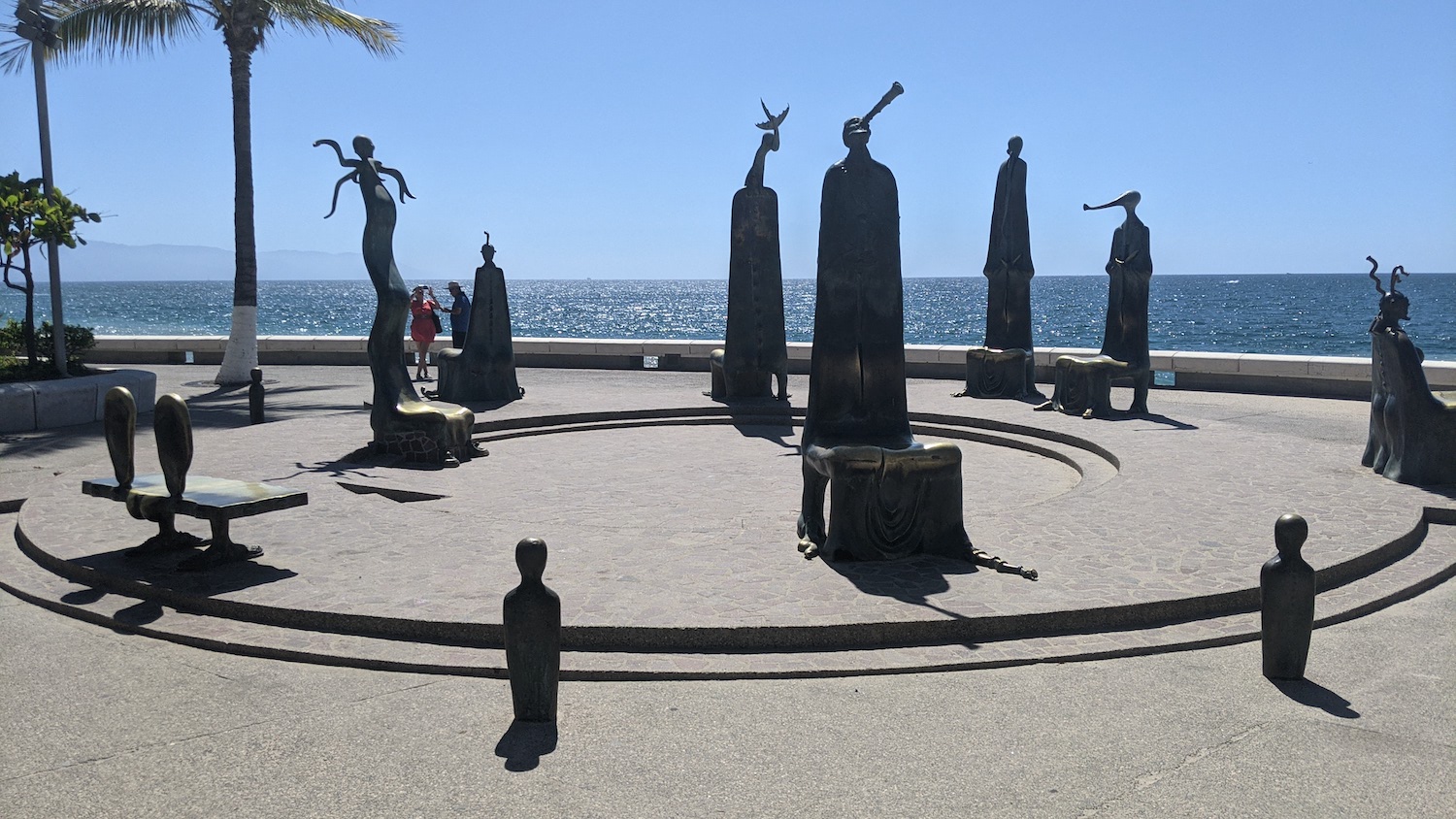American corporations such as Hilton Hotels are careful to export a complete American experience and install it fully on foreign soil. No matter the country, soft-skinned American wimps like us can escape to our creature comforts like clean water, air conditioning, and daily maid service. The Hilton of Puerto Vallarta is just such an oasis.
But our deeply unnerving experiences were not quite done.

The check-in counter, while covered from sun and rain, is completely outdoors, part of a long open breezeway from the sunny pool and beachfront to the parking and drop-off circle. Fountains in rock gardens bubble, tan bodies luxuriate with daiquiris on lobby furniture. Smartly dressed attendants hustle luggage on bellman’s carts, and charming young faces smile to welcome you to the check-in counter. There’s still a general hubbub of vacationers and traffic noise, but the hotel campus is clean and most of the staff speak perfect English.
Side note: Trina is a Diamond Hilton Honors Member, and we booked the hotel under her account.
At the counter, we gave our names. “It’s under Trina Mays. Uh, she’s a Diamond Honors member,” I said feeling smug and entitled.
After a small number of keyboard clicks, the spiffy hotel check-in staff fell silent. A strange, troubled expression came upon their faces. They started avoiding eye contact with us and furtively murmured to each other. Trina and I looked at each other. Behind us, more American families with children were queuing up looking at us in their straw hats and sunglasses and beach balls. Our check-in girl walked away without a word of explanation.
One minute later, another woman approached us, not in hotel uniform, but in professional business attire. This one was corporate. She motioned for us to follow her. We trundled our luggage along, entering a network of corridors, arriving at a spacious business office with a 20-foot ceiling. Modular desk, computer, printer. She asked us to take a seat. Then she left.
The room was quiet and cool, bathed in sunlight from a high window. Bon Jovi played in the distance. I felt for my passport in my pocket. I whispered, “do you know what’s going on?” She shook her head.
We sat there, once again worried for our safety. Worried that our reservations could not be found, that the authorities were seeking us, that the Vidanta agent had caught up with us. Did anyone on the outside know that we were in here?
The woman came back. She asked us if we would like a beverage—Coke, water, beer? We were relieved; they’re probably not going to kill us. But we were still worried that some really bad news was coming. The drinks were to prepare us for some devastating news.
“Bottled water would be great,” Trina said.
“Beer? What do you have?”
“Bud, Bud Lite, Miller, Coors. And we have Mexican beers. Corona, Modelo, Dos Equis, Pacifico—”
“Pacifico.”
“One moment.”
She came back with our drinks and sat down at the desk. Here it comes. We braced ourselves.
“Welcome to Puerto Vallarta! Have you been here before?”
“No.”

“Well I hope you enjoy your stay with us. I just need to see some ID and I’ll get you your room key.”
What? Yes. Apparently, being a Diamond Hilton Honors Member means you do not check in at the counter with the unwashed riff-raff of Puerto Vallarta. No. You check in in a calm, quiet room, seated, drinking a cold beer (at least at this hotel).
We relaxed. The small courtesies seemed too good to be true. She gave us our keys. She encouraged us to go straight out to the poolside and enjoy our drinks; a bellhop would immediately deliver our baggage to our room.
I asked her if she knew about Vidanta because of our airport experience. Yes, she said, it was a scam. “They say it is only a one-hour event but they keep you there all day.” All day. She knew of one family, she said, that only had three days in Puerto Vallarta. They lost an entire day trapped at the Vidanta tour.
Dear God, I thought.
We spent the rest of that day (it was only about 1pm) getting a buffet lunch and then walking the beach. A man with a rack of sunglasses asked if we wanted to buy some sunglasses. A woman buried in wool wraps asked if we wanted to buy bracelets.
Another man asked if we wanted to buy a box of Cuban cigars.
“No thanks.”
“Okay, some weed? Blow?”

“No thanks.”
We took a taxi to the Romantic District, an area with oceanfront shops, local art, exotic statuary, a flea market. As we stepped out of the taxi a man asked,
“Good day sir, would you like to buy Cuban cigars?”
“No thanks.”
“Okay, some weed? Blow?”
“No thanks.”
We found a small cathedral and went in to listen to five minutes of a choir and Catholic liturgy in Spanish. Then we left and went to buy some ice cream. Policemen were stationed on street corners, and as we walked along the sidewalk a man approached us.
“Cuban cigars, sir? Box of cigars?”
“No thanks.”
“Okay. Some weed? Blow?”
 We started avoiding all street vendors. They were persistent. Some would call at you across the street like an old high school friend. You shook your head mildly and kept walking. Most took your refusal as a young Romeo would take rejection from a lover.
We started avoiding all street vendors. They were persistent. Some would call at you across the street like an old high school friend. You shook your head mildly and kept walking. Most took your refusal as a young Romeo would take rejection from a lover.
Exhausted, we decided to retreat to the safety of our hotel where vendors were not allowed. Another taxi ride (about $3 US) took us several miles, rapidly, violently, through back streets, around hard corners, down cobblestone streets, past heartbreaking poverty and shocking living conditions, back to our comfortable American hotel.

The final surprise: in our hotel room, the bed had a colored-rice artwork on the blanket. You can see from the photos, it was loose, unglued rice, somehow laid on the bedspread, welcoming us.
 I was simultaneously impressed and appalled by the sheer inefficiency of it all. American that I am, I couldn’t help but think that some housekeeping staff person was paid to craft this design that would inspire amazement, yes, but quickly following a sense of befuddlement.
I was simultaneously impressed and appalled by the sheer inefficiency of it all. American that I am, I couldn’t help but think that some housekeeping staff person was paid to craft this design that would inspire amazement, yes, but quickly following a sense of befuddlement.
What were we supposed to do with it? A terrible mess just waiting to happen. If we ignored it and flung the rice all over the floor, then the same senorita who meticulously placed the rice there the day before would be sweeping it up into the dustbin tomorrow.
We felt the only humane thing to do was to take two minutes to make a valley of the blanket, funnel all the rice into a channel and pour it into the trashcan.
Trivial artwork is admired and thrown in the trash. Like a black parade pantomiming the disparity between the opulent Americans that we are, and the quiet desperation of the locals locked in a world of dirt and disease.







